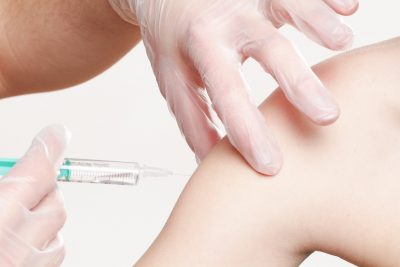A Cambridge-based biotech company’s coronavirus vaccine study at Boston’s Brigham and Women’s Hospital is “running smoothly,” according to a researcher working on the testing.

Moderna Therapeutics’ mRNA based COVID-19 vaccine is in its third and final phase of testing before it can be approved, according to clinical study protocol published on the company’s website.
A research team at Brigham and Women’s Hospital, led by infectious disease specialist Lindsey Baden, became in July the only New England test center for the vaccine, according to the hospital’s website.
The study is nearly full with enrollments, Baden said, with 30,000 participants nationally.
Baden said the trial will gather more information about how the vaccine will affect specific groups, such as senior citizens.
Study participants will schedule up to seven hospital visits over a two-year period, and will keep a diary of any symptoms between visits, according to Moderna protocol. Study staff will ask questions about participants’ health, draw blood, give a shot — either vaccine or placebo — and test participants for COVID- 19 during the visits, according to Brigham and Women’s vaccine trial web page.
Those enrolled in the study can participate at three locations: Brookside Community Health Center, Southern Jamaica Plain Health Center or Brigham and Women’s Hospital.
Professor Mansoor Amiji of Northeastern University’s Department of Pharmaceutical Sciences said it is important to take the time to properly test vaccines before they reach the public.
“There’s no way to expedite them,” Amiji said. “We have to do it in the right way … We want a safe and effective product for all Americans.”
Amiji said the vaccines developed by companies such as Moderna, Johnson & Johnson and AstraZeneca look promising because they quickly progressed to Phase 3. This means a vaccine could possibly be ready in the near future, he said.
“But depending on how quickly they’re able to generate the necessary data to provide evidence of safety and effectiveness,” Amiji said, “we can see their product approved either at the end of 2020 or in the first quarter of 2021.”
Baden said all vaccine trials will typically face complications, including during the third phase.
“It’s running smoothly, but there is no Phase 3 trial that doesn’t have lots of challenges just because of the size, 30,000 people, monitoring them for colds,” Baden said. “There are all sorts of challenges, but I consider that routine to studies of this scope and scale.”
Amiji said if the virus mutates during the trial, the vaccine may no longer cause the same immune response that prevents disease.
Despite these potential challenges, the COVID-19 vaccine is progressing, though researchers are unsure of when the vaccine will be ready.
The vaccine’s release date depends on its efficacy, which will be evidenced by a low COVID-19 transmission rate in communities with the vaccine, as well as the length of time it takes for the vaccine to gain approval from the Food and Drug Administration. This, Baden said, can range from months to years.
“How much follow-up do you need to be reassured that the safety is understood?” Baden said. “It’s a debatable question for the community.”






















































































































